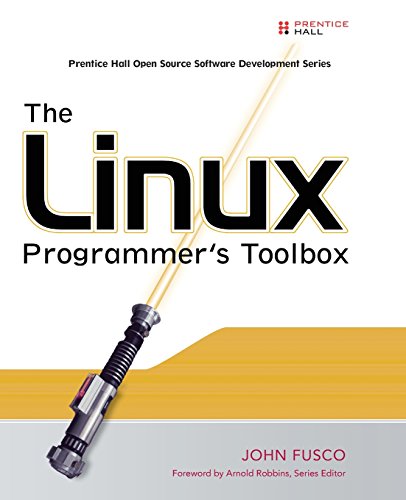Items related to The Linux Programmer's Toolbox

Synopsis
Master the Linux Tools That Will Make You a More Productive, Effective Programmer
The Linux Programmer's Toolbox helps you tap into the vast collection of open source tools available for GNU/Linux. Author John Fusco systematically describes the most useful tools available on most GNU/Linux distributions using concise examples that you can easily modify to meet your needs.
You'll start by learning the basics of downloading, building, and installing open source projects. You'll then learn how open source tools are distributed, and what to look for to avoid wasting time on projects that aren't ready for you. Next, you'll learn the ins and outs of building your own projects. Fusco also demonstrates what to look for in a text editor, and may even show you a few new tricks in your favorite text editor.
You'll enhance your knowledge of the Linux kernel by learning how it interacts with your software. Fusco walks you through the fundamentals of the Linux kernel with simple, thought-provoking examples that illustrate the principles behind the operating system. Then he shows you how to put this knowledge to use with more advanced tools. He focuses on how to interpret output from tools like sar, vmstat, valgrind, strace, and apply it to your application; how to take advantage of various programming APIs to develop your own tools; and how to write code that monitors itself.
Next, Fusco covers tools that help you enhance the performance of your software. He explains the principles behind today's multicore CPUs and demonstrates how to squeeze the most performance from these systems. Finally, you'll learn tools and techniques to debug your code under any circumstances.
Coverage includes
- Maximizing productivity with editors, revision control tools, source code browsers, and "beautifiers"
- Interpreting the kernel: what your tools are telling you
- Understanding processes–and the tools available for managing them
- Tracing and resolving application bottlenecks with gprof and valgrind
- Streamlining and automating the documentation process
- Rapidly finding help, solutions, and workarounds when you need them
- Optimizing program code with sar, vmstat, iostat, and other tools
- Debugging IPC with shell commands: signals, pipes, sockets, files, and IPC objects
- Using printf, gdb, and other essential debugging tools
Foreword
Preface
Acknowledgments
About the Author
Chapter 1 Downloading and Installing Open Source Tools
Chapter 2 Building from Source
Chapter 3 Finding Help
Chapter 4 Editing and Maintaining Source Files
Chapter 5 What Every Developer Should Know about the Kernel
Chapter 6 Understanding Processes
Chapter 7 Communication between Processes
Chapter 8 Debugging IPC with Shell Commands
Chapter 9 Performance Tuning
Chapter 10 Debugging
Index
"synopsis" may belong to another edition of this title.
About the Author
John Fusco is a software developer for GE Healthcare who specializes in Linux applications and device drivers. He has worked on Unix software for more than ten years and has been developing applications for Linux since kernel version 2.0. He has written articles for Embedded Systems Programming and Linux Journal.
"About this title" may belong to another edition of this title.
FREE shipping within U.S.A.
Destination, rates & speedsSearch results for The Linux Programmer's Toolbox
The Linux Programmer's Toolbox
Seller: Greenworld Books, Arlington, TX, U.S.A.
Condition: good. Fast Free Shipping â" Good condition book with a firm cover and clean, readable pages. Shows normal use, including some light wear or limited notes highlighting, yet remains a dependable copy overall. Supplemental items like CDs or access codes may not be included. Seller Inventory # GWV.0132198576.G
Quantity: 1 available
The Linux Programmer's Toolbox
Seller: SecondSale, Montgomery, IL, U.S.A.
Condition: Good. Item in good condition. Textbooks may not include supplemental items i.e. CDs, access codes etc. Seller Inventory # 00088031445
Quantity: 1 available
The Linux Programmer's Toolbox
Seller: ThriftBooks-Atlanta, AUSTELL, GA, U.S.A.
Paperback. Condition: Good. No Jacket. Pages can have notes/highlighting. Spine may show signs of wear. ~ ThriftBooks: Read More, Spend Less 2.11. Seller Inventory # G0132198576I3N00
Quantity: 1 available
The Linux Programmer's Toolbox
Seller: ThriftBooks-Dallas, Dallas, TX, U.S.A.
Paperback. Condition: Good. No Jacket. Pages can have notes/highlighting. Spine may show signs of wear. ~ ThriftBooks: Read More, Spend Less 2.11. Seller Inventory # G0132198576I3N00
Quantity: 1 available
The Linux Programmer's Toolbox
Seller: HPB-Red, Dallas, TX, U.S.A.
paperback. Condition: Good. Connecting readers with great books since 1972! Used textbooks may not include companion materials such as access codes, etc. May have some wear or writing/highlighting. We ship orders daily and Customer Service is our top priority! Seller Inventory # S_399733778
Quantity: 1 available
The Linux Programmer's Toolbox
Seller: Wonder Book, Frederick, MD, U.S.A.
Condition: Very Good. Very Good condition. A copy that may have a few cosmetic defects. May also contain light spine creasing or a few markings such as an owner's name, short gifter's inscription or light stamp. Seller Inventory # J07B-03215
Quantity: 1 available
The Linux Programmer's Toolbox
Seller: Goodwill of Silicon Valley, SAN JOSE, CA, U.S.A.
Condition: good. Supports Goodwill of Silicon Valley job training programs. The cover and pages are in Good condition! Any other included accessories are also in Good condition showing use. Use can include some highlighting and writing, page and cover creases as well as other types visible wear. Seller Inventory # GWSVV.0132198576.G
Quantity: 1 available
The Linux Programmer's Toolbox
Seller: GridFreed, North Las Vegas, NV, U.S.A.
Paperback. Condition: New. In shrink wrap. Seller Inventory # 68-01581
Quantity: 1 available
The Linux Programmer's Toolbox
Seller: Toscana Books, AUSTIN, TX, U.S.A.
Paperback. Condition: new. Excellent Condition.Excels in customer satisfaction, prompt replies, and quality checks. Seller Inventory # Scanned0132198576
Quantity: 1 available
The Linux Programmer's Toolbox
Seller: BennettBooksLtd, San Diego, NV, U.S.A.
paperback. Condition: New. In shrink wrap. Looks like an interesting title! Seller Inventory # Q-0132198576
Quantity: 1 available
